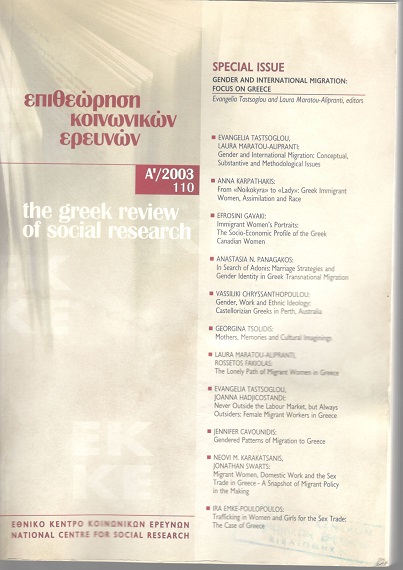From "noikokyra' to "lady": Greek immigrant women, assimilation and race
Abstract
This paper examines how upward mobility among Greek immigrant women in NYC affects their perceived roles in the family and also the narratives the women construct to frame their experiences. Class and labor market incorporation (formal vs. informal) mainly affect the type of narrative the women construct. Working class women use the ideology of the «noikokyra» to frame their experiences and responsibilities in the home and the community, while lower middle and middle class women select competing elements from American gender and class ideologies to construct their narratives. These two latter groups construct an American-based version of the «lady» as a goal which they aspire to. Despite the differences in gender ideologies between the lower middle and middle class women’s narratives, these two categories of women share the idea of «whiteness» as a goal to be achieved. The paper is based on one-hundred fifteen in-depth interviews with Greek immigrant women in New York between the ages of twenty-two and seventy.
Article Details
- How to Cite
-
Karpathakis, A. (2003). From "noikokyra’ to "lady": Greek immigrant women, assimilation and race. The Greek Review of Social Research, 110, 23–53. https://doi.org/10.12681/grsr.9165
- Section
- Articles

This work is licensed under a Creative Commons Attribution-NonCommercial 4.0 International License.
Authors who publish with this journal agree to the following terms:
- Authors retain copyright and grant the journal right of first publication with the work simultaneously licensed under a Creative Commons Attribution Non-Commercial License that allows others to share the work with an acknowledgement of the work's authorship and initial publication in this journal.
- Authors are able to enter into separate, additional contractual arrangements for the non-exclusive distribution of the journal's published version of the work (e.g. post it to an institutional repository or publish it in a book), with an acknowledgement of its initial publication in this journal.
- Authors are permitted and encouraged to post their work online (preferably in institutional repositories or on their website) prior to and during the submission process, as it can lead to productive exchanges, as well as earlier and greater citation of published work (See The Effect of Open Access).



